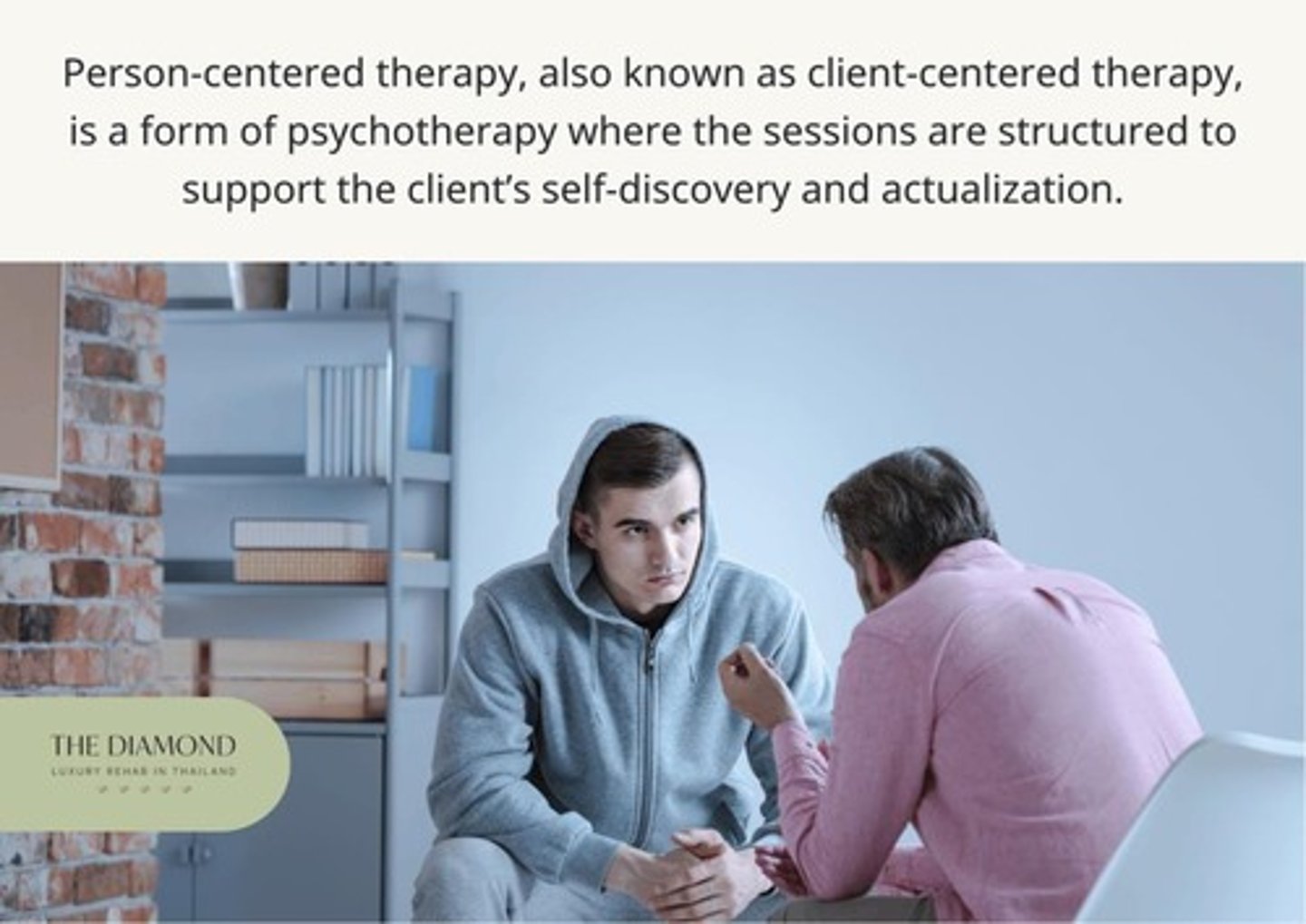Carl Rogers and Humanistic Personality Theory
1/65
There's no tags or description
Looks like no tags are added yet.
Name | Mastery | Learn | Test | Matching | Spaced | Call with Kai |
|---|
No analytics yet
Send a link to your students to track their progress
66 Terms
Client-Centered Therapy
Focuses on the client, not the therapist.
Self-Actualization
Natural movement towards personal potential fulfillment.
Humanistic Psychology
Emphasizes conscious perception over unconscious power.
Self-Concept
Individual's perception of self and reality.
Current Emotions
Present feelings shape personality more than past.
Autonomy
Self-governance is crucial for personal development.
Organismic Valuing Process
Evaluates experiences based on self-actualization contribution.
Experiential World
Individual's context influences personal growth and perception.
Positive Value Experience
Perceived experiences as fulfilling are valued positively.
Negative Value Experience
Perceived detrimental experiences are valued negatively.
Influences on Behavior
External and internal factors affect child behavior.
External Influences
Family, health, culture, and environment impact behavior.
Internal Influences
Self-acceptance and responsibility shape personal perception.
Actualization Tendency
Drive to maintain and enhance life functions.
Rational Beings
Humans are rational, guided by conscious perceptions.
Child Behavior Model
1930s model assesses healthy versus unhealthy behaviors.
Holistic Experience
Emphasizes total experience in personal growth context.
Perception vs Reality
Perception may differ from objective reality.
Motivation Towards Perfection
Humans strive for self-improvement and fulfillment.
Psychological Functioning
Development and maturity in psychological aspects.
Emotional Impact
Current emotions significantly influence personality development.
Childhood Events
Past events do not dictate self-perception.
Persepsi
Perception varies with time and context.
Penerimaan positif
Acceptance, love, and approval from others.
Keperluan sejagat
Universal and ongoing need for positive regard.
Kepuasan
Fulfillment derived from receiving positive regard.
Kehampaan
Feeling of emptiness from lack of acceptance.
Tingkah laku bayi
Infant behavior influenced by received affection.
Penerimaan positif tanpa syarat
Unconditional acceptance regardless of behavior.
Penerimaan sepenuhnya
Complete acceptance with an open heart.
Penerimaan positif kendiri
Self-esteem and positive self-image from within.
Maklum balas
Feedback from others affecting self-concept.
Penerimaan positif bersyarat
Acceptance given only under specific conditions.
Kepercayaan diri
Belief in self-worth based on external approval.
Incongruity
Discrepancy between real self and ideal self.
Tendency actualizing
Natural inclination towards personal growth.
Norms dan standard
Societal expectations shaping self-worth perceptions.
Real self
True self aligned with actualizing tendency.
Ideal self
Unattainable standard shaped by external conditions.
Penerimaan kendiri
Self-acceptance influenced by external validation.
Kecenderungan semulajadi
Natural inclinations towards perfection and self-development.
Situasi tertentu
Specific scenarios determining self-acceptance.
Persetujuan ibu bapa
Parental approval affecting child's self-worth.
Kecenderungan organisasi
Valuing needs aligned with personal growth.
Incongruence
Gap between real self and ideal self.
Neurosis
Mental distress caused by incongruence.
Self-concept
Individual's perception of themselves.
Anxiety
Response to incongruent experiences.
Client-Centered Theory
Approach focusing on client's self-discovery.

Humanistic Psychology
Psychological perspective emphasizing human potential.
Directive Therapy
Client leads; therapist facilitates the process.
Non-Directive Therapy
Therapist supports client's self-exploration.
Empathy
Understanding and sharing client's feelings.
Genuineness
Alignment of feelings and behaviors in therapy.
Congruence
Harmony between thoughts, feelings, and actions.
Acceptance
Unconditional regard for the client.
Fully Functioning Person
Individual open to experiences and growth.
Awareness
Recognition of all feelings and experiences.
Living in the Moment
Experiencing life fully and richly.
Trust in Self
Confidence in one's own feelings and actions.
Freedom of Choice
Ability to make decisions without constraints.
Creativity
Adaptability and spontaneity in behavior.
Complexity and Challenge
Life involves continual growth and testing.
Meaningful Personality
Character described as enriching and exciting.
Potential
Capacity for personal growth and development.
Parental Influence
Children learn to deny unacceptable behaviors.